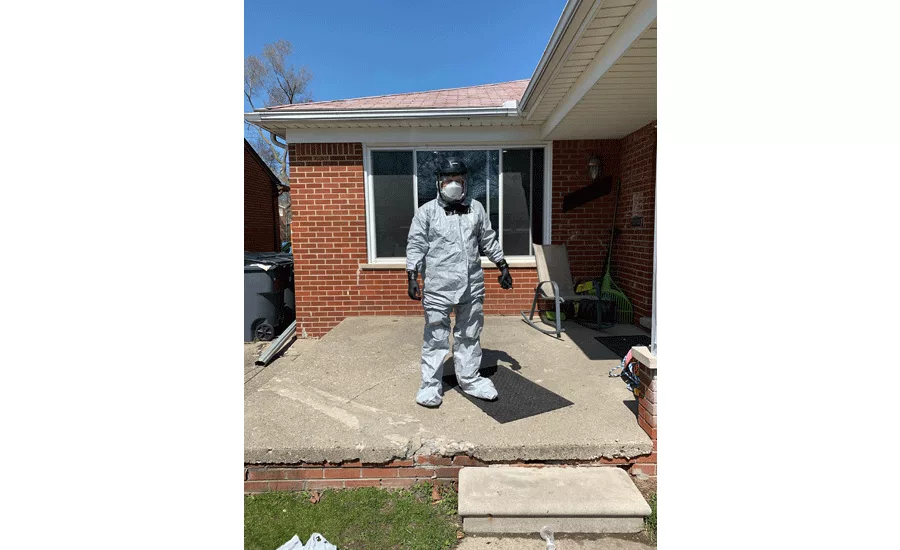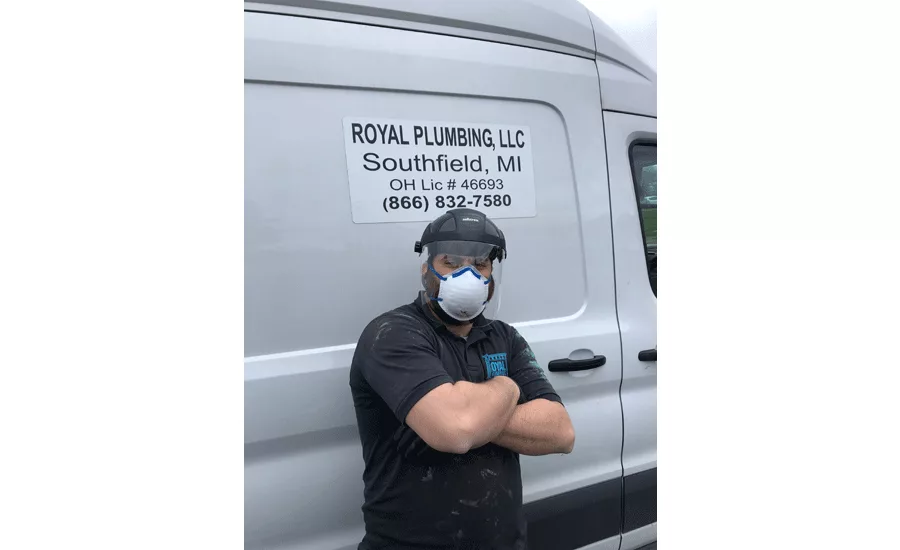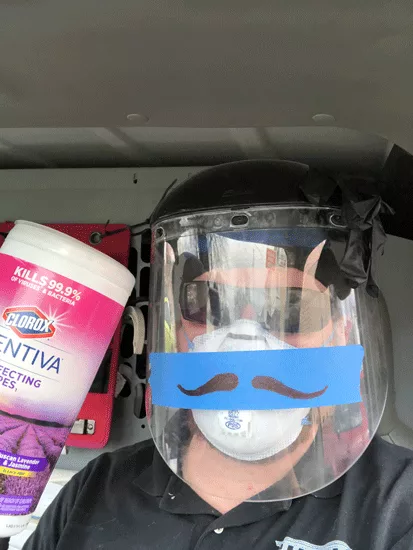Michigan plumber services COVID-19-positive clients during pandemic
Royal Plumbing employees adhere to strict health and safety protocols while in the field.




Master plumber Noah Klein is no stranger to life’s challenges. When his father was injured on a job, he took over running his owner-operator plumbing business at age 16, and then again at 18 when his father spent a summer working on his aunt’s house in California. He started his own business — Southfield, Michigan-based Royal Plumbing — in 2005 at 23 years old.
In the last 15 years, his company has grown to eight employees, six of them full-time field technicians. Unlike some companies during the coronavirus pandemic, Royal Plumbing — deemed an essential service by the federal government and the state of Michigan — has been servicing clients who tested positive for COVID-19.
Klein has implemented strict employee protocols for working in the field during the global pandemic, and is personally involved in any calls with COVID-19 symptoms or diagnosis.
“My big concern initially was how do I keep my employees safe?” Klein explains. “Then, the question went from keeping my employees safe to how can I assure my customers that we are being safe? Because people are very concerned about being contagious while asymptomatic and I want to ensure my customers feel safe having us in their homes.”
EARLY RESPONSE
On March 6 — before there were any coronavirus cases in Michigan — Klein got in touch with an Oakland County physician to learn all he could about COVID-19 and how it spread. After the first few cases appeared in Michigan days later, he had another discussion with several other doctors, then came out with his initial set of protocols on March 11.
“We’ve updated our protocols multiple times; not only in terms of the protections in place, but also how employees handle those protections between jobs,” Klein says. “Meaning, N95 masks are so expensive and hard to get right now. We can't dispose of them after every job, so we're reusing these masks. What's the safe way to do that? How many days between each use? How do you store them? All of these things are in our protocols that we've updated.”
When things took a turn for the worse in Michigan in mid-March, Klein called his doctor contacts and asked them to have an infectious disease specialist review his company’s protocols.
“A good friend of mine who is a neurologist took them to the chief of infectious disease at his hospital,” Klein says. “He had one or two minor changes, such as handwashing before and after every call — even with gloves — because people can touch their face when they have a glove on and not realize it.
“It became more and more clear that we were going to end up servicing clients who have symptoms, because a sewer backup is an emergency even if you're sick, so we obtained proper PPE, including full hazmat suits and other protections through tremendous expense,” he continues. “When this thing first started, 50% of my time was spent on PPE, either researching, speaking with doctors, writing the protocols, which have to be authored with a legal tongue and have been reviewed by my attorney, or spent finding PPE. Today, all the shipments from China are in. I just passed a gas station the other day, they're selling KN95s. There's a paper goods store in my area that's selling KN95s as well. You can buy hazmat suits from eBay or Amazon. A month ago, finding this stuff was very, very difficult.”
SAFETY PROTOCOLS
Klein set up his regimented protocols and trained all of his employees on them. Royal Plumbing has gone into two COVID-19-positive houses, and is waiting on parts for a third.
“It's one thing to have a protocol in place; it's another thing to make sure that the employees are actually following it,” he says. “My manager is maintaining enforcement of the day-to-day protocols, checking with the guys, driving to jobs to ensure that they're actually wearing the masks and not just saying that they are.
“When it comes to actually going into a home that’s symptomatic, I'm personally involved on every single call,” he continues. “The big thing about COVID-19 that is so scary is how much we don't know. At least for the first two weeks, protocols were being changed every day. I really thank God that I’m an EMT myself, so I was getting those emails from the state as the EMS guidelines changed. Because I have preexisting relationships with physicians, we stayed ahead of the curve. We went from customers yelling and screaming at us saying, ‘I can’t have you here,’ to explaining to them what we knew, and the entire dynamic changed. Even though we spent so much time, effort and over $7,000 on this, the rewarding factor is we’re doing the right thing — we’re able to use these protocols and maintain our customers’ needs safely.”
PLUMBERS PROTECT HEALTH AND SAFETY OF THE PUBLIC
Royal Plumbing — like many other essential businesses — is screening its clients when they call for service.
“The difference is that if somebody is in quarantine or if they're COVID-19-positive, we have a procedure implemented where I'm personally involved,” Klein says. “And we do not go into somebody’s home who's symptomatic without a physician approval on every single call. One of our steps includes a physician who is unbiased determining whether the plumbing emergency is urgent enough that allows us to go in. We have physician advisers who give us the OK.
“I’m not specifically in the plumbing business to make money,” he continues. “Making money and being profitable is necessary to being in business — I have to be able to support my family. We were not really prepared for COVID-19, but one thing I’ve seen growing up in the trade is that plumbing is essential. If you look anywhere in the world, the No. 1 factor determining mortality rate is not access to doctors, it's access to clean water. If you go throughout Africa and Asia, the places where the mortality rates are the highest are those where they have access to clean drinking water and proper sanitary services. That's more important than electricity. It's more important than anything else. And that is why we do this.”
When coronavirus hit the state hard, Klein knew there was no way he would turn away customers with emergency plumbing needs.
“I knew I couldn’t tell a family that they have to sit with sewage in their basement because somebody in the house is sick,” he explains. “That's immoral and it's wrong at the highest level. You have to be able to service your clients no matter what happens. If you own a company and you are not prepared to do that, you are not living up to the obligation we have as business owners.”
Klein spoke of a low-income customer he serviced in Detroit in a tenant house. The couple was COVID-19-positive, and had a sewer backup.
“I’m a Sabbath Observant Jew,” Klein explains. “Friday night is the Sabbath, and it’s important I get home in time. That night, I didn’t get home until 10 minutes before sundown because this was our first COVID-19 call. I needed to make sure my employees were safe, and I actually ended up having to go in myself because the job was a little complicated. We were able to implement all of our procedures and get that customer taken care of safely within a very reasonable amount of time. And I take tremendous pride in that we were able to do that.”
Another recent case had a family of eight in a single home where one of two toilets was not working. As such, Royal Plumbing’s physician advisor gave the OK to enter the home.
“You can’t expect a family of eight people to live with one toilet,” Klein notes. “That family couldn’t afford the bill — the procedures we have to implement are expensive;our minimum charge to go into a household with COVID-19 is $150 above our normal rate. I ended up eating some of that myself because it's so important that these customers are able to live safely.”
COVID-19 IMPACTS
Like many other plumbing companies out there, Royal Plumbing is getting hit by the lack of business. However, there are several things it is able to do. Firstly, Klein says he thanks God that plumbing is deemed an essential business, so his company is not hit nearly as hard as nonessential businesses. He has also experienced an uptick in emergency service calls, including some large jobs that are emergency in nature, such as sewer repairs and more.
As for how COVID-19 will affect the plumbing industry in the long run, Klein gives his honest opinion — he doesn’t really know.
“We are being optimistically cautious,” he says. “We’re getting a lot of jobs right now for work people are planning when this is over. However, nobody really knows when this will be over. The current feeling amongst professionals is that some level of work will resume in May.
“On the flip side, our commercial work has really been down about 80%, so we’ve been focusing more on the residential service side because that’s where the work is right now,” Klein continues. “If anything, residential work has increased because of COVID-19. Are we applying for the government loans and things like that? Absolutely. But, at the same time, we are doing what we can to restructure a little bit to where the more profitable work is right now.“
Klein adds that the COVID-19 pandemic is unprecedented.
“You can't compare it to anything else,” he notes. “You can't compare it to the 1918 Spanish Flu. You can't compare it to H1N1. The simple reason is that, in 1918, the world was a very different place. They were in the middle of the World War I. Today, a huge challenge is the fact that the media —everybody from Fox News to CNN — is, in my personal humble opinion, getting this wrong. Some people are saying it's not such a big deal and we have to open businesses, while other people are saying it's a huge deal and we've got to shut everything down. The answer is neither of those two extremes. You have to do what the doctors tell you in your personal, independent situation.”
“You can service anybody if you do it safely, with proper protections in place,” Klein adds. “That is what our advising physicians — four different doctors from two different hospital chains — have told me. I really hope this article will get more contractors on board to pick the phone and call their county officials. Every doctor I’ve spoken with has taken the time to explain this virus and told me to call if I had further questions. The doctors are there to help us, and there are ways that you can do your job safely. And, if you're servicing clients, even if they're asymptomatic, and you don't have proper protections in place, then you are just as bad as anybody else out there who's going to work who shouldn't be.”
13 COVID-19 EMPLOYEE PROTOCOLS TO IMPLEMENT NOW
Noah Klein, president of Royal Plumbing in Southfield, Michigan, began implementing new employee procedures before the first coronavirus case appeared in Michigan. Since early March, the protocols have been updated several times, as more knowledge about COVID-19 becomes available. Klein has implemented mandatory procedures and protocols for asymptomatic customers and any COVID-19-positive household or those under quarantine must have Klein’s permission before service can be performed.
Here are Klein’s 13 protocols and procedures employees must follow:
- On residential service calls, dispatch staff will initially inquire if anyone in the residence is ill. In such a case, Noah will be directly involved to ensure compliance with specific protocols that govern service with a symptomatic household member;
- No employee may accept any after-hours emergency at a home with a resident who has fever or respiratory problems without clearing this with Noah first. (Exceptions are chronic patients, without fever, who have been diagnosed with another ailment.)
- To any employee who feels at all ill: Immediately contact your doctor and Noah. You may require quarantine. The Beaumont COVID-19 Alert Hotline is 1-800-592-4784.
- Truck stock must include: five N95 respiratory masks per person, one face shield, one bottle of hand sanitizer, one tube of disinfectant wipes, two boxes of nitrile gloves, and one forehead thermometer;
- Each morning, prior to work, you must answer the questions in the Symptom Check on our dispatch app. This includes a forehead temperature reading with your company thermometer;
- Twice per day, you must disinfect the cab of your truck, your phone and all door handles;
- Before and after every service call, wash both hands, including fingernails, for 20 seconds with soap. If this is not feasible, and only secondarily, you may use hand sanitizer;
- Ensure that at least once every three hours, you wash your hands with soap for 20 seconds. Please keep some water, along with the hand soap provided, in your truck.
- In addition to washing hands, all residential service calls require gloves for the entire duration of the call. You may not reuse gloves once they have come in contact with any surface in the house. (Please do not be wasteful of gloves. There are in limited supply as well);
- On all service calls, including commercial, you must wear a mask;
- Due to recent developments of possible bacteria growth due to mask reuse, current guidelines are to rotate the masks every four days. You now require four masks per technician. Due to shortages, please do not discard masks;
- Stored masks must be kept in brown paper bags. Plastic bags may not be used;
- You must wear a face shield on all drain cleanings and on jobs that may soil your mask;
- Emphasis: You must have at least one, unused N95 mask, per person, kept for emergency situations. You may not use this mask unless directed to do so by Noah.
- Even with gloves on, avoid touching others, such as shaking hands; and
- Avoid touching your face and eyes.
Looking for a reprint of this article?
From high-res PDFs to custom plaques, order your copy today!








